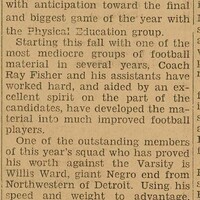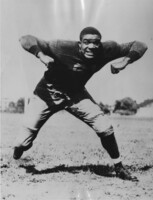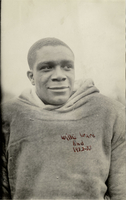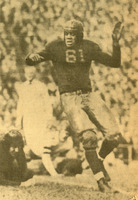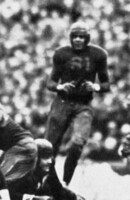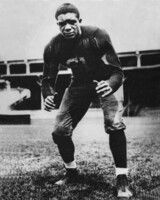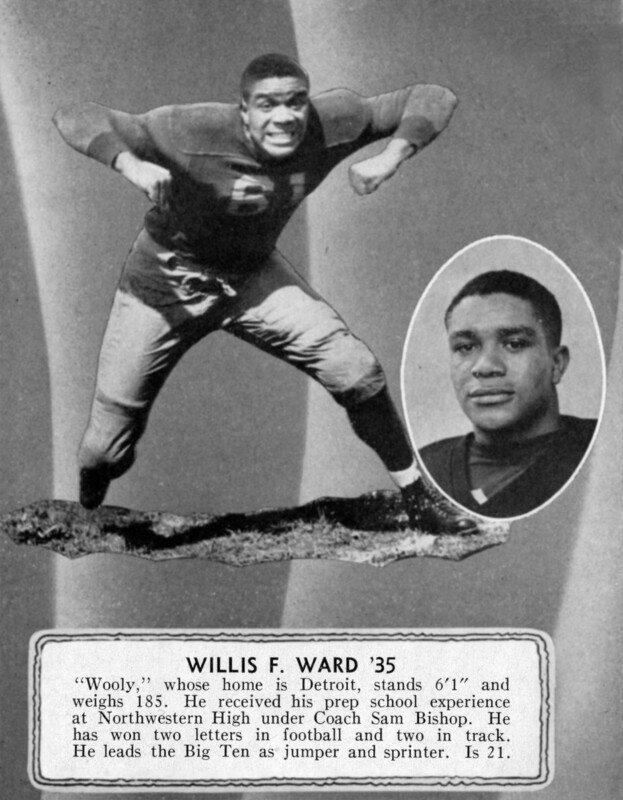He Came to Play Football
Freshman
Ward was the star of the 1931 freshman football team. The Michigan Daily’s freshman season wrapup was headlined, “Ward, Giant End, Shows Promise of Yearling Eleven; Is Star High Jumper.” He “proved his worth against the varsity” and, with his speed, “he had the ability to go for long passes beyond the reach of the opponents secondary.” He was also judged a standout defender and a good kicker and punter.
Despite his success on the freshman team, Ward faced a special test when he joined the varsty squad. As quoted by Bill Gibson in the Baltimore Afro-American, coach Kipke ordered the rest of the team "to level at him without mercy" in practice sessions. "If, at the end of the week he doesn't turn in his uniform, then I know I've got a great player." What could have been Kipke's motives for inflicting such a brutal test? Possibly, two: to convince himself that Ward was talented and tough enough to make this experiment worthwhile, and to prepare Ward for the type of intentional violence and rough play he might face from opponents.
Sophomore
As a sophomore on a defending conference champion team loaded with veteran stars, including captain Ivan Williamson and future All-American Ted Petoskey at ends, Ward wasn’t expected to see much action, let alone get a starting berth.
In the fourth game of the season against Illinois, Petoskey was switched to halfback and Ward got his first start. Michigan Alumnus magazine praised his defensive work: “And his end was death to an Illinois attack. On one occasion three Illini tried to block him. He held them all off, never lost his feet and finally stopped the play after an eight-yard loss. They stayed away after that.” He would miss only three games the rest of his career—twice due to injuries, once because he was Black.
In the following game against Princeton, Ward played the full 60 minutes for the first time, scored his first touchdown, and was again a star on defense. “His end was impregnable. Even in the first half Princeton found it impossible to get him off his feet. He swept aside blockers with long powerful arms and generally did the tackling himself. And in the second half, when he got his sleeves rolled up and really went to work, Princeton became thoroughly ‘fed up’ with him.”
Junior
Ward started every game at right end his junior year. He also became known for his punt coverage. In the 1933 Cornell game, “the press box oracles vowed he outran one of [John] Regeczi’s punts—and those kicks are not lazy affairs. At any rate he was 60 yards down the field when the ball arrived in the Cornell safety man’s hands, and Willis proceeded calmly and efficiently to the ‘kill.’”
In the Ohio State game, the Buckeyes were threatening Michigan’s 6-0 lead when Ward intercepted a pass and returned it 50 yards before a desperate tackler lunged and clipped his heels just enough to prevent a touchdown. Against Chicago’s star punter Jay Berwanger, “Ward made his life miserable just about the whole afternoon and did block one.” In the final game of the season, a 13–0 win at Northwestern that clinched the conference title, Ward caught a 37-yard touchdown pass from Bill Renner. Michigan was declared national champion and Ward received All-American honorable mention recognition.
Senior
Despite not being selected captain for the 1934 season, Ward's senior-year prospects seemed bright and he was widely considered a lock for All-American honors. After two successive national championships, expectations for the team were high. However, the loss of many senior stars from 1933 would lead to two bad early-season losses. The October 20 game, against Georgia Tech, would destroy what was left of team morale. Michigan finished 1–7 and scored only 21 points; Ward accounted for 12 of them.
In a 16–0 opening loss to Michigan State, “Ward and Ford were the two Wolverines who stood out from their fellows. Ward was absolutely invincible on defense.” In the homecoming game against Illinois, Ward scored on a 24-yard run off a lateral from end Mike Savage. His extra-point attempt missed and the Wolverines lost 7–6. Ward kicked two field goals to account for all the scoring Michigan could muster in a season-ending loss to Northwestern. The team’s poor showing, and splitting time between right end and halfback, doomed Ward's chances for post-season honors.
It was a disappointing way to end his career, but Ward had made his mark on Michigan football.
A Casual Slur?
The 1934 Michigan home game programs included a composite headshot and action photo along with a brief biographical sketch for some of the top players, sometimes including a nickname. Most of the nicknames were common or innocuous: “Jerry” Ford, “Jawn” Regeczi, “Tiny” Wright, "Hildy" HiIdebrand. Ward was given the nickname “Wooly”—a common racist slur.
Ward was known to take his name, Willis, seriously. From childhood, his father had insisted his playmates and friends call him Willis rather than Willie. Gerald Ford was the rare adult who called him Willie. His listing on the Sphinx page in the Michiganensian was one of the few instances he appeared as Willie in print.
Was the game program nickname an intentional racist slur? Perhaps a poor attempt at cleverness? Was Ward even aware of it? There is no record of him commenting on it. None of the Ward historians have noted it. Perhaps it was a one-time incident—or an example of the common, casual indignities endured by African American students.
Sources: Behee-Ward interview; Michigan Daily, Michiganensian, Michigan Alumnus Magazine; Willis Ward papers (DPL); U-M Athletic Dept. records

